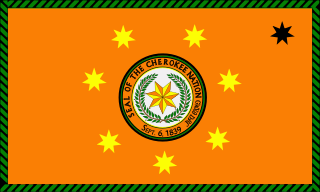Related Research Articles

The Cherokee people are one of the Indigenous peoples of the Southeastern Woodlands of the United States. Prior to the 18th century, they were concentrated in their homelands, in towns along river valleys of what is now southwestern North Carolina, southeastern Tennessee, southwestern Virginia, edges of western South Carolina, northern Georgia and northeastern Alabama consisting of around 40,000 square miles.

Indian Territory and the Indian Territories are terms that generally described an evolving land area set aside by the United States government for the relocation of Native Americans who held original Indian title to their land as an independent. The concept of an Indian territory was an outcome of the U.S. federal government's 18th- and 19th-century policy of Indian removal. After the American Civil War (1861–1865), the policy of the U.S. government was one of assimilation.

The Shawnee are a Native American people of the Northeastern Woodlands. Their language, Shawnee, is an Algonquian language.
The Lumbee are a mixed-race community primarily located in Robeson County, North Carolina, which claims to be descended from a myriad of indigenous tribes who once inhabited the region.
The Eastern Band of Cherokee Indians (EBCI), is a federally recognized Indian tribe based in western North Carolina in the United States. They are descended from the small group of 800–1,000 Cherokees who remained in the Eastern United States after the U.S. military, under the Indian Removal Act, moved the other 15,000 Cherokees to west of the Mississippi River in the late 1830s, to Indian Territory. Those Cherokees remaining in the east were to give up tribal Cherokee citizenship and to assimilate. They became U.S. citizens.

The United Keetoowah Band of Cherokee Indians in Oklahoma is a federally recognized tribe of Cherokee Native Americans headquartered in Tahlequah, Oklahoma. According to the UKB website, its members are mostly descendants of "Old Settlers" or "Western Cherokees," those Cherokees who migrated from the Southeast to present-day Arkansas and Oklahoma around 1817. Some reports estimate that Old Settlers began migrating west by 1800, before the forced relocation of Cherokees by the United States in the late 1830s under the Indian Removal Act.
State-recognized tribes in the United States are Native American tribes or heritage groups that do not meet the criteria for federally recognized Indian tribes but have been recognized by a process established under assorted state government laws for varying purposes or by governor's executive orders. State recognition does not dictate whether or not they are recognized as Native American tribes by continually existing tribal nations.

The Cherokee Nation, formerly known as the Cherokee Nation of Oklahoma, is the largest of three federally recognized tribes of Cherokees in the United States. It includes people descended from members of the Old Cherokee Nation who relocated, due to increasing pressure, from the Southeast to Indian Territory and Cherokees who were forced to relocate on the Trail of Tears. The tribe also includes descendants of Cherokee Freedmen and Natchez Nation. As of 2024, over 466,000 people were enrolled in the Cherokee Nation.

The Native American tribes in Virginia are the Indigenous peoples whose tribal nations historically or currently are based in the Commonwealth of Virginia in the United States of America.
Cherokee heritage groups are associations, societies and other organizations located primarily in the United States. Such groups consist of persons who do not qualify for enrollment in any of the three federally recognized Cherokee tribes. As the Cherokee Nation enrolls all people who can prove descent from a Cherokee ancestor, many of these groups consist of those who claim Cherokee ancestry but have no documentation to prove this alleged heritage. Some have had their claims of ancestry checked and proven to be false. A total of 819,105 Americans claimed Cherokee heritage in the 2010 Census, more than any other named tribe in the Census.

Native American recognition in the United States, for tribes, usually means being recognized by the United States federal government as a community of Indigenous people that has been in continual existence since prior to European contact, and which has a sovereign, government-to-government relationship with the Federal government of the United States. In the United States, the Native American tribe is a fundamental unit of sovereign tribal government. This recognition comes with various rights and responsibilities. The United States recognizes the right of these tribes to self-government and supports their tribal sovereignty and self-determination. These tribes possess the right to establish the legal requirements for membership. They may form their own government, enforce laws, tax, license and regulate activities, zone, and exclude people from tribal territories. Limitations on tribal powers of self-government include the same limitations applicable to states; for example, neither tribes nor states have the power to make war, engage in foreign relations, or coin money.
The Northern Cherokee Nation of the Old Louisiana Territory is a 501(c)(3) nonprofit organization of individuals who self-identify as Cherokee but are not state or federally recognized as a Native American tribe or government. The headquarters for the NCNOLT is in Columbia, Missouri.

The Ridgetop Shawnee Tribe of Indians is an inactive limited liability company, nonprofit organization, and unrecognized tribe in Kentucky. Founded as an organization in 2009, they identify as being of Shawnee and Cherokee descent.
On the eve of the American Civil War in 1861, a significant number of Indigenous peoples of the Americas had been relocated from the Southeastern United States to Indian Territory, west of the Mississippi. The inhabitants of the eastern part of the Indian Territory, the Five Civilized Tribes, were suzerain nations with established tribal governments, well established cultures, and legal systems that allowed for slavery. Before European Contact these tribes were generally matriarchial societies, with agriculture being the primary economic pursuit. The bulk of the tribes lived in towns with planned streets, residential and public areas. The people were ruled by complex hereditary chiefdoms of varying size and complexity with high levels of military organization.
The Lipan Apache Tribe of Texas is a state-recognized tribe and nonprofit organization in Texas. Members of the tribe descend from the Lipan Apache, a Southern Athabaskan Indigenous people. The Lipan Apache Tribe of Texas is headquartered in McAllen, Texas.

The Echota Cherokee Tribe of Alabama is a state-recognized tribe in Alabama and Cherokee heritage group. It is based in northern Alabama and gained state-recognition under the Davis-Strong Act in 1984.

Native Hawaiians are the Indigenous peoples of the Hawaiian Islands. Since the involvement of the United States in the overthrow of the Kingdom of Hawaii, federal statutes have been enacted to address conditions of Native Hawaiians, with some feeling these should be formalized in the same manner of sovereignty as other Indigenous populations in the United States and Alaska Natives. However, some controversy surrounds the proposal for formal recognition – many Native Hawaiian political organizations believe recognition might interfere with Hawaiian claims to independence as a constitutional monarchy through international law.

Native American tribes in Texas are the Native American tribes who are currently based in Texas and the Indigenous peoples of the Americas who historically lived in Texas.
References
- ↑ Southern Cherokee Nation Shares Their Culture. State Journal. 6 August 2008. Retrieved 5 February 2011.
- ↑ Glenn, Eddie. "A League of Nations?" Tahlequah Daily Press. 6 January 2006. Retrieved 25 January 2011.
- ↑ "UNC Press :: The Encyclopedia of North Carolina". uncpress.unc.edu. 2016-12-23. Archived from the original on 2016-12-23. Retrieved 2022-07-31.
- 1 2 Hume, Sarah (November 23, 2023). "Written out of existence? Native Americans in Kentucky push for recognition of culture". Courier Journal . Retrieved January 15, 2024.
- ↑ "State Recognition of American Indian Tribes". National Conference of State Legislatures. Retrieved January 15, 2024.
- ↑ Rowley, D. Sean (March 14, 2022). "CNFO is resource for entertainment productions". Cherokee Phoenix . Retrieved 2024-01-02.
SCNK members claim descent from Cherokees who were members of the Treaty Party and marched west in the Removal. They say their ancestors fled the Cherokee Nation for Kentucky around 1871 to escape violence following the Civil War. The SCNK has received some state and municipal acknowledgements, but a 2011 bill to give it official state recognition died in the Kentucky Senate after passing the House of Representatives.
- ↑ McVeigh, Tony (February 17 2011). KY Tribes Looking for State Recognition. WKMS . Retrieved June 2012
- ↑ Kentucky Legislature HB50 11RS WWW Version [ dead link ] March 2011, lrc.ky.gov. Retrieved October 2011.
- ↑ Ouden, Amy E. Den; O'Brien, Jean M. (2013). Recognition, Sovereignty Struggles, & Indigenous Rights in the United States: A Sourcebook. UNC Press Books. p. 125. ISBN 978-1-4696-0215-8 . Retrieved 31 July 2022.